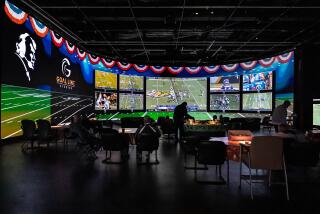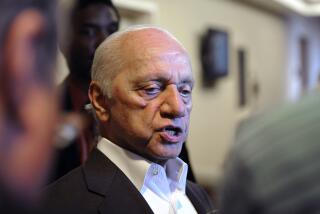Art Modell dies at 87; Cleveland Browns owner enraged fans with move to Baltimore
Art Modell, a marketing executive who helped negotiate the NFL’s first television contract and later enraged fans when he moved the Cleveland Browns franchise to Baltimore, has died. He was 87.
Modell died Thursday of natural causes at Johns Hopkins Hospital in Baltimore, the Baltimore Ravens announced. He had a history of heart problems.
“Art Modell’s leadership was an important part of the NFL’s success during the league’s explosive growth during the 1960s and beyond,” NFL Commissioner Roger Goodell said in a statement. “Art was a visionary who understood the critical role that mass viewing of NFL games on broadcast television could play in growing the NFL.”
A high school dropout who made a fortune on Madison Avenue and married a television actress, Modell bought the Browns in 1961 for $3.9 million. The team had won three NFL championships during the 1950s and added another under Modell in 1964.
He would later leave Cleveland as a pariah for moving the team in 1996 to Baltimore, where, under a deal with the NFL, it became the Ravens, leaving the Browns name in Cleveland for a new team to adopt.
In 2001, a year after Modell sold 49% of the Ravens for $275 million, the team won its first championship since 1964 and its only Super Bowl, beating the New York Giants, 34-7.
Modell finally sold his majority share in 2004, ending 43 years of active ownership, during which time he shaped not only a franchise but the entire league.
He was one of former NFL Commissioner Pete Rozelle’s most trusted advisers as the league rose in the 1960s and ‘70s to become the most popular U.S. spectator sport.
Modell helped negotiate the league’s first national television contract, a two-year, $4.6-million agreement with CBS in 1962. In 1970, he participated in negotiations with ABC that led to “Monday Night Football.” He was chairman of the owners’ committee that negotiated the first collective-bargaining agreement with players in 1968.
He also helped develop the NFL’s revenue-sharing system, which he called the biggest reason for the league’s success and popularity, since it helps teams in smaller media markets compete with those in big cities. “It’s imperative that revenue sharing be the hallmark of this league,” Modell said shortly before stepping down as owner in 2004.
Despite his impact and influence on the league, Modell was never elected to the Pro Football Hall of Fame.
“He worked alongside Lamar Hunt, Tex Schramm, Well [Wellington] Mara and Art Rooney, and all of those men are in the Hall of Fame,” former Browns guard John Wooten said. “He worked with them in all of those meetings. He was there. It is indeed a shame that he is not in the Hall of Fame.”
Arthur Bertram Modell was born to George Modell, a day laborer, and his wife, Kitty, on June 23, 1925, in Brooklyn, N.Y.
When Modell was 14, his father died. He soon left high school and got his first job as an electrician’s helper, cleaning out the hulls of ships in a local shipyard. He served in the U.S. Army Air Forces, the predecessor of the U.S. Air Force, during World War II, then made use of the GI Bill to attend a television school in New York. Starting in 1948, he helped create some of the earliest daytime programming on ABC.
In 1954, he joined the New York advertising firm of L.H. Hartman Co., where he became a partner and made his fortune.
Cleveland fans expressed skepticism, and sometimes hostility, when the New Yorker Modell bought the Browns in 1961. After the 1962 season, Modell dismissed Paul Brown, a legend in Cleveland, as the team’s founding head coach.
After the Browns won the NFL championship in 1964, they lost the title game in 1965, 1968 and 1969. On three other occasions, they came one game short of reaching the Super Bowl, losing all three times to the Denver Broncos.
Though Cleveland had one of the most loyal fan bases in the NFL, Modell said in the 1990s that he couldn’t compete with teams that had modern stadiums with luxury boxes. The city refused to build him a new stadium, so after the 1995 season, he moved the franchise to Baltimore, where they became the Ravens.
Cleveland didn’t let the team go without a fight. The city sued Modell for more than $300 million as fans marched on the stadium carrying signs reading “Art the Ripper.” At one game, a fan sat a Modell effigy in an electric chair with a sign reading “Pull the Switch,” while another group marched around the parking lot carrying a coffin.
After a settlement with the league and the city, Modell wound up owing Cleveland $12 million in damages, and the NFL promised to put an expansion team in the city. That team, the current Browns, started play in 1999. Even then, Cleveland fans didn’t exactly forgive Modell. “There are people in Cleveland today who still can’t forgive Art for taking his team to Baltimore,” Wooten said. “It’s an injustice.”
Saddled with $185 million of debt he incurred during the move, Modell agreed in December 1999 to sell a 49% stake in the team to Stephen Bisciotti, owner of temporary-employment company Allegis Group Inc.
In 1969 Modell married Patricia Breslin, who starred in the 1950s television show “People’s Choice” and played Meg Baldwin on the soap opera “General Hospital.” He adopted her two sons, John and David, from a previous marriage. She died last October.
Modell is survived by his two sons and six grandchildren.
“I have a great legacy, tarnished somewhat by the move,” Modell said in 1999. “The politicians and the bureaucrats saw fit to cover their own rear ends by blaming it on me.”
Modell chose to remember the good times in Cleveland, saying in another interview, “The fans in Cleveland were loyal and supportive. They lived and died with me every Sunday for 35 years.”
More to Read
Start your day right
Sign up for Essential California for the L.A. Times biggest news, features and recommendations in your inbox six days a week.
You may occasionally receive promotional content from the Los Angeles Times.






